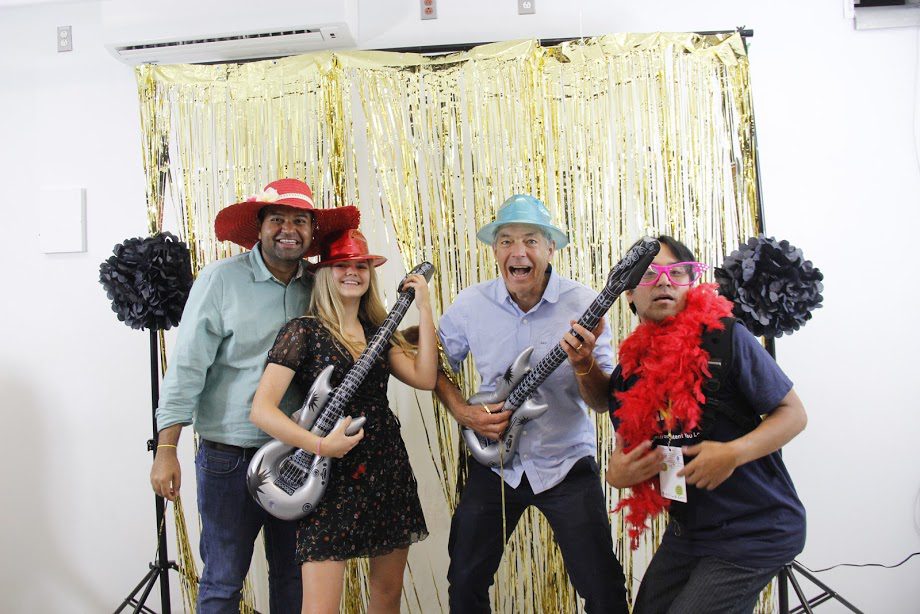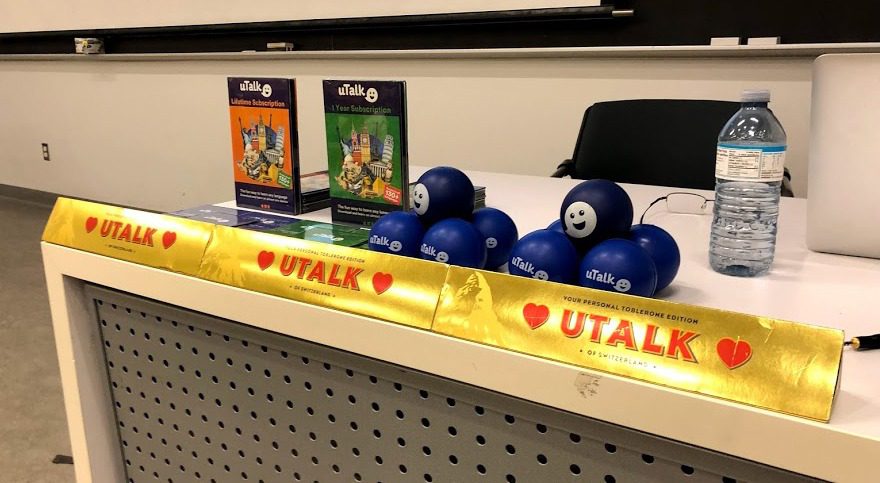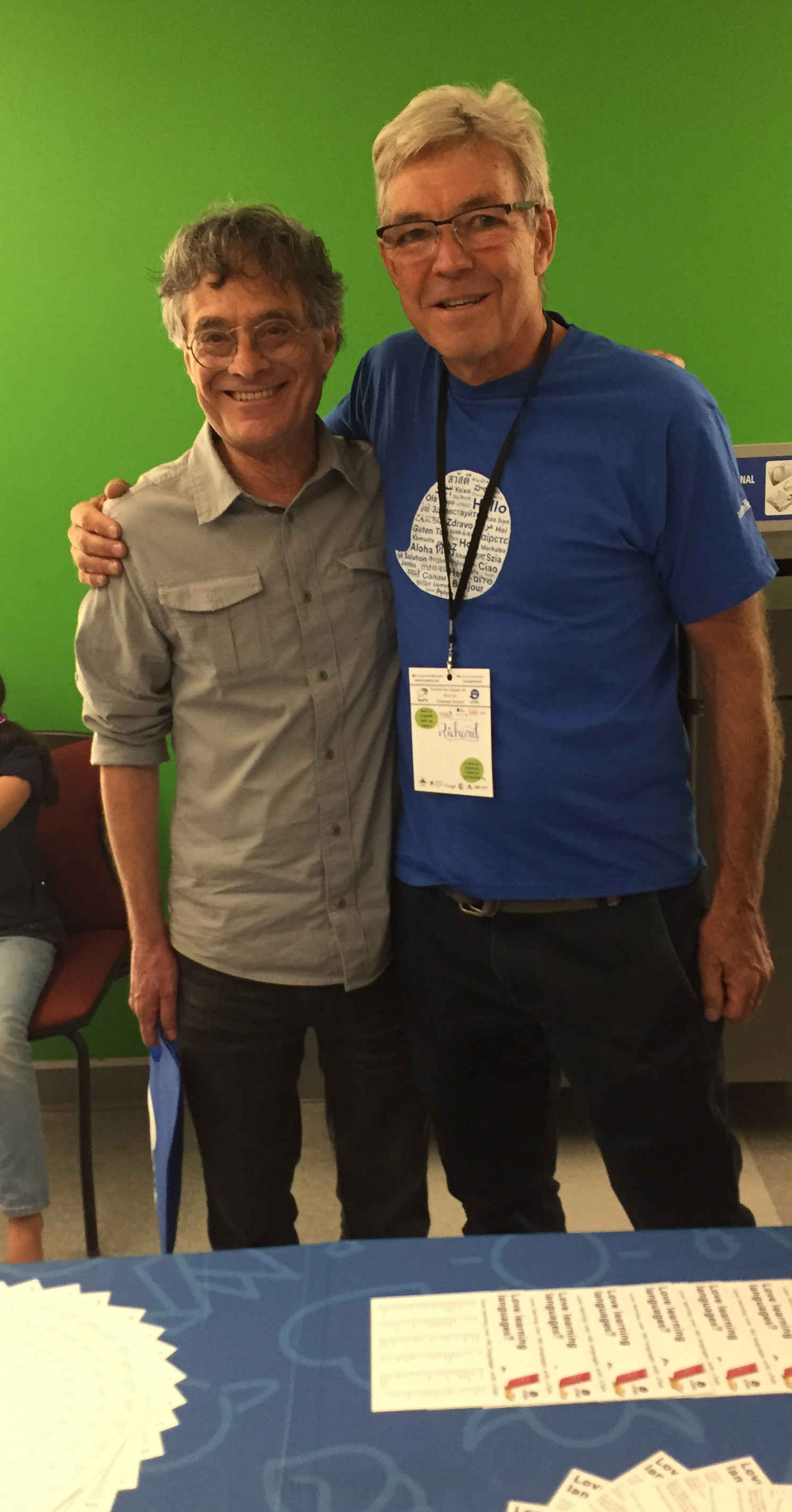
Our friendly quizmasters spent a fun weekend chatting all things language, including brief forays into Anishinaabemowin (Ojibwe), Breton, and Klingon.
Everything had been rehearsed. The audience was waiting, phones at the ready, thumbs twitching in anticipation. To be certain that it would all go off without a hitch, there was an ethernet cable plugged into the laptop—no WiFi here.
And then…
Then, the internet died.
It could have been a disaster for Dick, uTalk’s CEO, Adi, and Maria, all three of whom were hosting uTalk’s language quiz at LangFest at the University of Montreal this past weekend. Fortunately, the audience, made up of polyglots and language enthusiasts abound, were patient and friendly and, once the internet issue had been fixed, the quiz really did go off without a hitch!
(Well, mostly.)
The answers came thick and fast (with an average answer time of around seven seconds, as Dick put it, “watching the scores was almost as exciting as watching Ben Stokes playing cricket.”) and after three rounds, the prizes—Toblerones and other well-received British chocolate—had all been handed out. We had almost 100 participants per round and everyone seemed to enjoy themselves, especially when the questions turned towards our uTalk app, but of course a weekend full of language activities left Dick, Adi, and Maria with even more to explore.

uTalk Language Quiz: Top Three Scorers
Round One: Jason O, kevinsun, Aspańsar
Round Two: KevinSun, Gennaio, Jason O
Round Three: KevinSun, Luke ????, Gario
(Kevin, we might have to talk about letting you participate next year! 😉)
Aside from the quiz, or the fun, Italian-themed dinner, there were plenty of different talks and workshops on offer, covering constructed languages, endangered languages and everything in between.
For Dick, the most intriguing talk of the event was that hosted by Ninaatig Staats Pangowish, ‘Language of the 8th fire’. He spoke about Anishinaabemowin, or Ojibwe, an indigenous language spoken by the Ojibwe people across Canada and down as far south as Oklahoma in the US. With around 90,000 native speakers, it is considered—linguistically—to be a relatively healthy indigenous language. However, like many indigenous and native languages, Ojibwe has suffered as a result of colonialism and a core part of Ninaatig’s talk was the impact that has had on him and the people around him. He began speaking Ojibwe at the age of twenty, so does not consider himself a native speaker, but as he is teaching the language to his children, they will be the ones to pass it on natively. As well as talking about his journey with Ojibwe, and the language itself, Ninaatig also took the time to teach an Ojibwe song, which all the participants appeared to enjoy.
Karl Haloj’s ‘Atelier sur le breton’ talk was also of interest, as this is a language uTalk have been hoping to add to our growing collection of Celtic languages (Scottish Gaelic, Irish, Welsh, and Manx) for some time. There are some issues regarding the correct standardisation of Breton, sadly, which have held up the progress of our course, but did not seem to stop Haloj here, who taught his audience some words and phrases, much to their delight.
Adi found himself impressed with the Language Creators’ Night, hosted by Marc Okrand and David J. Peterson, creators of languages for Star Trek and Game of Thrones, respectively. This was a fun look at what goes into the creation of a new language (a lot of work, clearly!) and as it was the first time Okrand and Peterson had ever shared a platform, it was quite a remarkable night.

Of course, uTalk already has a relationship with Marc Okrand—he helped out with our Klingon products years ago, creating new, everyday words specially for our users to interact with their world a little more easily. Marc even pointed out that Klingon has now come so far it would be possible to translate our entire new corpus into English; the only issue with languages that are constructed for a particular purpose is that often there are separate bodies that hold the copyright, which sadly makes it more difficult to create content to help people learn them.
Aside from the talks, our three representatives enjoyed a host of different activities, some of which were more Canadian than LangFest-specific: they tried poutine for the first time; Maria was interviewed by Kerstin Cable for the Fluent Language podcast; they met The Struggling Linguist, who created the Language Lounge, a place for everyone to speak the languages they know; they had interesting chats with lots of different people, including Jonty Yamisha (OptiLingo), and the organisers of LangFest, Tetsu, Nicolas, and Joey—who is stepping down this year; they laughed at memes about Steve Kaufmann (LingQ); and a German-Irish guy spoke to Adi in Punjabi, which took him aback just a bit!
The biggest takeaway, however, for our uTalk team, was that LangFest embodied a lot of what we’re about. We are driven by the value that we want people to make friends—that’s why we want people to speak from the get-go. LangFest is a place where everyone is making friends, constantly. Everyone is friendly and open and that is part of why we decided to go. We also went because we want to reach people—both to use the languages we already offer, but also to help us develop more languages, because the more languages we add, the more people we can reach, and the more people we can reach, the more friends they are making.
In the last round of our quiz, one of the questions was, ‘How many languages have uTalk been asked to do?’ The answer is more than 300. As of right now, we offer 143 languages and we really, really want to add more. Our most important first step is connecting with speakers of those languages—speakers like Ninaatig Staats Pangowish—to see if their community would like our support and to see how we can go about doing that. Events like LangFest help us to make those connections, while also allowing us to see how our app—and language learning, as a whole—are helping people to make friends all around the globe.
If you were at LangFest this weekend, we really hope you had a great time! And if you have any ideas of where we could find speakers for any language we don’t currently offer (but particularly for indigenous or endangered ones; it is the International Year of Indigenous Languages, after all!), please send us an email at languages@utalk.com.
Finally, we’d like to thank the organisers of LangFest for making it such an amazing experience for everyone involved. We wish you all the luck in the world for next year!